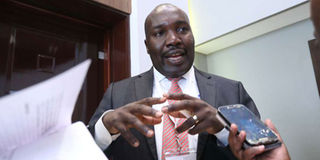Kenya accuses US of acting in bad faith by cutting funding

Julius Korir at the Crowne Plaza Nairobi hotel on March 29, 2017. PHOTO | DIANA NGILA | NATION MEDIA GROUP
What you need to know:
Health Permanent Secretary Julius Korir also disputed the claim that taxpayers had lost Sh5 billion in a procurement scandal at the ministry as reported in a preliminary audit last year.
He stated that the final analysis by the National Treasury indicated that there was no money lost.
The government has accused the United States of acting in bad faith by cutting funding to the Ministry of Health over corruption and mismanagement concerns despite a meeting with Afya House officers two weeks ago.
Health Permanent Secretary Julius Korir also disputed the claim that taxpayers had lost Sh5 billion in a procurement scandal at the ministry as reported in a preliminary audit last year, stating that the final analysis by the National Treasury indicated that there was no money lost.
This came as Council of Governors chairman Peter Munya requested the US to channel the Sh2.1 billion withdrawn from the ministry to the devolved units. Speaking to the Nation after the launch of Participatory Forest Management Plans by the Kenya Forest Service (KFS) and community forest associations at Marania Forest Station, Buuri Sub-County, in his Meru County, Mr Munya said counties needed money for devolved health services.
“We met every condition that they set for us: the internal controls for monitoring money, having competent personnel to implement the programmes that are funded and sealing all loopholes that would jeopardise accountability, among others,” said Mr Korir of the meeting.
'NOT CHANGE'
Despite the denials, however, Mr Bernard Muchere, the man who blew the lid off the scam, on Wednesday maintained that there were massive improprieties at Afya House that had led to the embezzlement of funds. The final report of the audit is yet to be made public.
“Our findings did not change,” Mr Muchere told the Nation by phone. “The same issues we raised in the preliminary audit are the same ones we highlighted in our final findings.”
Mr Korir, however, differed with this position, saying it had come down to the senior auditor’s word “against that of his colleagues who prepared the final report”.
Well, it could have been the scandal, or something else, that forced the US to withdraw a portion of its health funding. But whichever way you look at it, the slightest sign of impropriety on the use of donor funds could not have come at a worse time for Kenya.
Apart from the Cabinet Secretary for Health, Dr Cleopa Mailu, who as expected is doing everything possible to present a fair image of the ministry, everybody at Afya House is mum. But it is too late, really. Kenya’s poor performance in the management of donor funding has sealed its fate.
EXECUTIVE ORDER
The final leg of the journey to leaner coffers started in March, about four months after news of the scandal broke, with an executive order from US President Donald Trump that announced that his budgetary allocations would henceforth put America first. In this regard, he pushed a 62-page proposal to cut USAid funding by 28 per cent.
Among other things, USAid protects the interests of the American people by containing threats such as diseases at the “scene of crime”. It has worked with organisations such as the Centres for Disease Control (CDC) to ensure that Ebola does not leave the confines of West Africa into the US.
In Kenya, the agency’s programmes are in, but not limited to, strengthening of health systems through information and training, management of HIV through outfits such as the President’s Emergency Plan for Aids Relief (Pepfar), malaria control initiatives, as well as maternal and child health.
This, though, is not the first time attempts have been made at disbanding USAid and other independent agencies on claims of being unable to advance US interests and manage funds.
It happened in 1992, during the George Bush Snr regime, while in 1995 it lost some of its autonomy and in 2006, State Secretary Condoleeza Rice clipped its budgetary powers.
Two years later, USAid started making demands on accountability with stipends for international trips as high as Sh60,000 a day per person.
Additional reporting by Elizabeth Merab and David Muchui.





